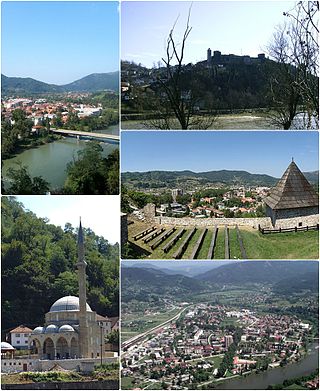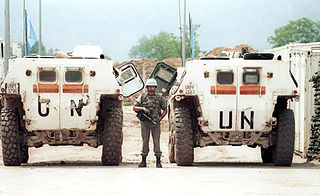| |||||
| Decades: | |||||
|---|---|---|---|---|---|
| See also: | |||||

The following lists events that happened during 1999 in Bosnia and Herzegovina .
| |||||
| Decades: | |||||
|---|---|---|---|---|---|
| See also: | |||||

The following lists events that happened during 1999 in Bosnia and Herzegovina .

The State Union of Serbia and Montenegro or simply Serbia and Montenegro, known until 2003 as the Federal Republic of Yugoslavia, FR Yugoslavia (FRY) or simply Yugoslavia, was a country in Southeast Europe located in the Balkans that existed from 1992 to 2006, following the breakup of the Socialist Federal Republic of Yugoslavia. The country bordered Hungary to the north, Romania to the northeast, Bulgaria to the southeast, North Macedonia to the south, Croatia and Bosnia and Herzegovina to the west, and Albania to the southwest. The state was founded on 27 April 1992 as a federation comprising the Republic of Serbia and the Republic of Montenegro. In February 2003, it was transformed from a federal republic to a political union until Montenegro seceded from the union in June 2006, leading to the full independence of both Serbia and Montenegro.

1999 (MCMXCIX) was a common year starting on Friday of the Gregorian calendar, the 1999th year of the Common Era (CE) and Anno Domini (AD) designations, the 999th year of the 2nd millennium, the 99th year of the 20th century, and the 10th and last year of the 1990s decade.

Doboj is a city in Republika Srpska, Bosnia and Herzegovina. It is situated on the banks of the Bosna river, in the northern region of Republika Srpska. As of 2013, it has a population of 71,441 inhabitants.

The Federation of Bosnia and Herzegovina is one of the two entities composing Bosnia and Herzegovina, the other being Republika Srpska. The Federation of Bosnia and Herzegovina consists of ten autonomous cantons with their own governments and legislatures.

The Yugoslav Wars were a series of separate but related ethnic conflicts, wars of independence, and insurgencies that took place from 1991 to 2001 in what had been the Socialist Federal Republic of Yugoslavia. The conflicts both led up to and resulted from the breakup of Yugoslavia, which began in mid-1991, into six independent countries matching the six entities known as republics that had previously constituted Yugoslavia: Slovenia, Croatia, Bosnia and Herzegovina, Montenegro, Serbia, and Macedonia. SFR Yugoslavia's constituent republics declared independence due to unresolved tensions between ethnic minorities in the new countries, which fueled the wars. While most of the conflicts ended through peace accords that involved full international recognition of new states, they resulted in a massive number of deaths as well as severe economic damage to the region.

The Bosnian War was an international armed conflict that took place in Bosnia and Herzegovina between 1992 and 1995. The war is commonly seen as having started on 6 April 1992, following a number of earlier violent incidents. The war ended on 14 December 1995 when the Dayton accords were signed. The main belligerents were the forces of the Republic of Bosnia and Herzegovina, the Republic of Herzeg-Bosnia, and the Republika Srpska, the latter two entities being proto-states led and supplied by Croatia and Serbia, respectively.

Fudbalski klub Sarajevo, IPA:[fûdbalskiːklûːbˈsarajɛvo], English: Sarajevo Football Club), is a professional football club based in Sarajevo, the capital city of Bosnia and Herzegovina and is one of the most successful clubs in the country.

Vincent Tan Chee Yioun is a Malaysian Chinese businessman and investor. He is the founder of Berjaya Corporation Berhad, a diversified conglomerate listed on the Malaysian stock exchange. Besides holding stakes through the Berjaya Corporation group of companies, Tan's other stakes include interest in internet–related businesses, water utilities, media, retail and telecommunications.

Gradačac is a city located in the Tuzla Canton of the Federation of Bosnia and Herzegovina, an entity of Bosnia and Herzegovina. It is situated in the northeastern part of Bosnia and Herzegovina, roughly 40 km (25 mi) south of the Sava river. As of 2013, it has a population of 39,340 inhabitants. The city is well known for its castle.

Hrvatski športski klub Posušje is a professional association football club based in Posušje that is situated in Bosnia and Herzegovina. The club is best known for winning the First League of Herzeg-Bosnia in 1999 and 2000, the top flight ethnic Croat league in Bosnia and Herzegovina at the time.

The Pliva Waterfall is located by the town of Jajce, in central Bosnia and Herzegovina, where the river Pliva meets the river Vrbas. The waterfall is a large tufa, also known as travertine barrier, making over 22 meters cascade on the Pliva river, in a narrow karstic zone, which follows the Pliva course, retracted into a flysh and limestone contact zone. It was 30 meters high, but after an earthquake during the Bosnian war and attacks on the power plant further up the river, the area was flooded and now the waterfall is 22 meters high.

Bosnia and Herzegovina has participated in the Eurovision Song Contest 19 times since making its debut in 1993, after coming second in the qualification round "Kvalifikacija za Millstreet". The current Bosnian-Herzegovinian participant broadcaster in the contest is the Radio and Television of Bosnia and Herzegovina (BHRT).

Gunja is a village and municipality in Croatia.

Edin Dervišhalidović, known professionally as Dino Merlin, is a Bosnian singer-songwriter and record producer. Born in Sarajevo, he was the founder and leader of Merlin, which was one of the best-selling rock bands of Southeast Europe.

Maglaj is a town and municipality located in the Zenica-Doboj Canton of the Federation of Bosnia and Herzegovina, an entity of Bosnia and Herzegovina. It is located in northern Bosnia and Herzegovina, 25 km (16 mi) south of Doboj. It has a population of 6,438, with 34,980 inhabitants in the municipality.

A flood-meadow is an area of grassland or pasture beside a river, subject to seasonal flooding. Flood-meadows are distinct from water-meadows in that the latter are artificially created and maintained, with flooding controlled on a seasonal and even daily basis.

The Drina is a 346 km (215 mi) long river in the Balkans, which forms a large portion of the border between Bosnia and Herzegovina and Serbia. It is the longest tributary of the Sava River and the longest karst river in the Dinaric Alps which belongs to the Danube River drainage basin. Its name is derived from the Roman name of the river which in turn is derived from Greek which is derived from the native name of Illyrian origin.

The Battle of Vrbanja Bridge was an armed confrontation which took place on 27 May 1995, between United Nations (UN) peacekeepers from the French Army and elements of the Bosnian Serb Army of Republika Srpska (VRS). The fighting occurred at the Vrbanja Bridge crossing of the Miljacka river in Sarajevo, Bosnia and Herzegovina, during the Bosnian War. The VRS seized the French-manned United Nations Protection Force (UNPROFOR) observation posts on both ends of the bridge, taking hostage 12 French peacekeepers. Ten were taken away, and two were kept at the bridge as human shields.

Between 13 and 18 May 2014 a low-pressure cyclone designated Tamara and Yvette affected a large area of Southeastern and Central Europe, causing floods and landslides. Serbia and Bosnia and Herzegovina suffered the greatest damage, as the rain was the heaviest in 120 years of recorded weather measurements. By 20 May, at least 62 people had died as a result of the flooding, and hundreds of thousands had been forced from their homes. Towns of Obrenovac in Serbia and Doboj in Bosnia and Herzegovina account for most victims, after being inundated by several-meter high waters from nearby rivers.
1999–2000 Bosnia and Herzegovina Football Cup was the sixth season of Bosnia and Herzegovina's annual football cup. The Cup was won by Željezničar who were first in the final group.